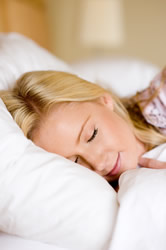
Ideally a person should sleep during the hours of darkness and wake up naturally when the sun rises. The further you move into the Northern hemisphere the more difficult this plan becomes. Many studies have shown that sleeping before midnight is very important – the sleep you have before midnight being twice as important as the hours you get after midnight due to the synchronizing of the meridians of the body and the various organ systems.
Avoid before bed snacks, particularly grains and sugars. They will raise blood sugar and inhibit sleep. Later when blood sugar drops too low you might wake up and be unable to fall back to sleep.
Sleep in complete darkness – or as close as possible. Light in the room can disrupt your circadian rhythm and your pineal gland’s production of melatonin and seratonin. Listen to white noise, nature sounds or relaxation CDs. No TV just before bed. TV is too stimulating to the brain and it will take longer to fall to sleep. It is also disruptive to the pineal gland for the same reason.
Get to bed as early as possible. Our systems, particularly the adrenals, do the majority of their recharging or recovering during the hours of 11pm and 1am. In addition your gallbladder dumps toxins during this same period. If you are awake, the toxins back up into the liver, which then secondarily backs up into your entire system and causes further disruption of your health. Prior to the widespread use of electricity, people would go to bed shortly after sundown, as most animals do and which nature intended humans to do as well. Keep the temperature in the bedroom no higher than 70 degrees.
Have a high protein snack several hours before bed. This can provide the L-tryptophan needed to produce melatonin and serotonin. Also eat a small piece of fruit. This can help the tryptophan cross the blood-brain barrier.
Avoid Caffeine. A recent study showed that caffeine is not metabolized in some people efficiently and therefore the effects can be felt long after drinking it. Also some medications, particularly diet pills and cold remedies contain caffeine.
Avoid Alcohol. Although alcohol will make people drowsy, the effect is short-lived and people will often wake up several hours later, unable to fall back to sleep. Alcohol will prevent you from falling into the deep stages of sleep, where the body does most of its healing and repair work.
Avoid foods that you may be sensitive to. This is particularly true for dairy and wheat products as they may have an effect on sleep such as causing apnoea, excess congestion and gastrointestinal upset. Don’t drink any fluids within 2 hours of going to bed. This will reduce the likelihood of needing to get up to go to the bathroom.

Take a hot bath, shower or sauna before bed. When body temperature is raised in the late evening, it will fall at bedtime, facilitating sleep. Don’t change your bedtime. You should go to bed and get up at the same time every day, including the weekends. This will help your body get into a sleep routine, making it easier to fall asleep and get up in the morning. Too Little Sleep May Accelerate Aging.
Sleep debts (where a pattern of inadequate sleep exists) has a very similar impact to being continually under stress. Both are very damaging to a variety of vital bodily functions. Regularly catching only a few hours of sleep can hinder metabolism and hormone production in a way that is similar to the effects of aging and the early stages of diabetes. Chronic sleep loss may speed up the onset or increase the severity of age-related conditions such as type 2 diabetes, high blood pressure, obesity and memory loss. Research showed that just one week of sleep deprivation altered the subjects’ hormone levels and their capacity to metabolise carbohydrates.
Also see: The Secret of Sleep and Quick Facts – The Pineal Gland And Melatonin
